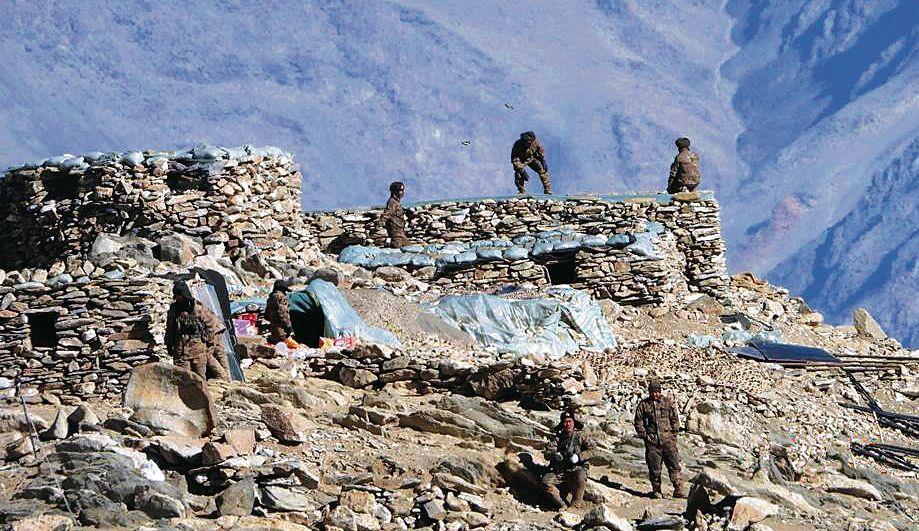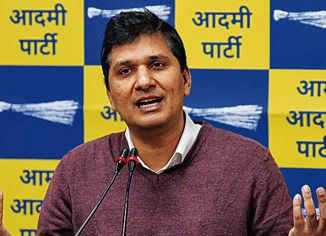
DECEPTIVE: The Chinese remain in control of Indian territory, despite an agreement on withdrawal. Reuters
G Parthasarathy
Chancellor, Jammu Central University & Former High Commissioner to Pakistan
THERE have been contentious debates on whether India should discard its policy of non-alignment in an emerging world order that is getting increasingly dominated by an aggressive China. There is merit in abiding by the ideals of non-alignment or ‘genuine non-alignment’. We have good relations with the US and Russia. The reality is that the threats we face from across our borders are from the Xi Jinping-led People’s Republic of China. Beijing has used its growing economic and military power on and across its land and maritime borders against 18 neighbouring countries to enforce its territorial claims on them. We are also now seeing increased determination in countries like Vietnam to resist Chinese efforts to trample over them.
Given China’s links with the Taliban, India should strongly back the Ghani government in Afghanistan.
The crude belief of the Chinese establishment is that Beijing sets the rules for bilateral relationships, while others have to abide by them. China’s policies towards India are clear. It aims to contain India by the use of military force for ‘salami slicing’ and acquiring Indian territory in phases. While the concentration was earlier on seizing territory on our eastern borders, the focus has shifted to Ladakh. After a tense face-off involving the deployment of tanks on the Himalayan heights last year, agreement was reached on a Chinese withdrawal. This was accompanied by the understanding that China’s troops would have to return to positions they held in January 2020. The Chinese, however, remain in control of Indian territory in Depsang, Gogra and Hot Springs.
In its effort to contain India, China has made it a point to back political parties and leaders across South Asia, who it believes are anti-India. This was evident in recent years in Nepal, the Maldives, and Sri Lanka. This Chinese strategy does not always work, as most South Asian leaders now see no gain in unnecessarily offending India. Moreover, leaders like Sheikh Hasina in Bangladesh and the astute monarchy in Bhutan are too experienced to be influenced by such Chinese efforts. China refuses to recognise the present borders of Bhutan. It also continues to use Pakistan to undermine India’s interests, whether it is in Afghanistan by backing the Taliban, or by enhancing Pakistan’s military, maritime, missile and nuclear capabilities. Moreover, China’s BRI is now running into trouble, as it leads recipient countries like the Maldives, Pakistan and Sri Lanka into a debt trap, thereby mortgaging their sovereignty. India is now better placed to respond to China’s efforts to become the dominant and hegemonic power across the Indian and Pacific Oceans.
China has territorial and maritime boundary disputes with 18 countries across its land and maritime boundaries, commencing with its maritime boundary claims on large parts of Vietnam. Beijing regularly voices its claims to the territory of Vietnam, citing historical precedents. Beijing claims that the disputed territories were once controlled by it during the rule of its Ming Dynasty. Beijing also has unjustifiable claims on Vietnamese territory in the Paracel Islands, parts of the South China Sea, and the Spratly Islands.
China also has untenable claims on its maritime borders with the Philippines. Beijing has violated international law by refusing to abide by the order of an international tribunal, which rejected its claims. Apart from its territorial claims on India, Japan, the Philippines, Russia and Vietnam, China also has territorial disputes with Nepal, Bhutan, North and South Korea, Taiwan, Brunei and Tajikistan, and even with ASEAN members, like Singapore, Brunei, Malaysia, Indonesia, Cambodia and Laos. But, instead of displaying unity to counter China’s territorial ambitions, ASEAN countries are divided on how to deal with China’s territorial claims.
In their declaration titled ‘The Spirit of the Quad’ on March 12, the leaders of the US, India, Japan and Australia focused on measures for cooperation in dealing with Covid-19. They also pledged to promote a ‘free, open, rule-based order, rooted in international law’ to promote security, and counter threats in the Indo-Pacific, and beyond’. More significantly, they noted: ‘We commit to promoting a free, open-based order, rooted in international law, to advance security and prosperity. We support the rule of law, freedom of navigation, and overflight, peaceful resolution of disputes, democratic values, and territorial integrity.’ The meeting resulted in agreement that the US would establish a plant to produce one billion vaccines a year in India, by Johnson & Johnson, by the end of 2022. In the meantime, however, Johnson & Johnson is facing production problems in the US, where its share in the production of Covid vaccines is marginal.
It is evident that rather than seeking to resolve differences across its neighbourhood in the Indian and Pacific Oceans, China seeks to impose its will on others, with whom it shares land and maritime borders. This is despite the fact that there is no dearth of groupings like ASEAN and BIMSTEC that are seeking to promote regional economic cooperation. China, however, wishes to enforce its rules when it comes to its territorial claims. It is in this background that given China’s links with the Taliban, it is only appropriate for India to strongly back the democratically elected Ghani government in Afghanistan.
The American withdrawal from Afghanistan has been conducted in an inexplicable manner. The US has left the Afghanistan army equipped like a paramilitary force, with hardly any artillery, tanks and other essential equipment. Despite its propagandistic claims, the Taliban have yet to take control of even a single provincial capital. There would be disappointment, if the US does not deal firmly with Pakistan-backed terrorism in Afghanistan. The US has, instead, promoted another Quad, which is meant to link it with Pakistan, Afghanistan and Uzbekistan. This does look rather odd, when the challenge the Afghans are facing is the continuing support of Pakistan for the Taliban. India, however, has its own friends in Afghanistan with whom it can cooperate, and do its best, to assist a friendly neighbour sailing in troubled waters.
Join Whatsapp Channel of The Tribune for latest updates.




























